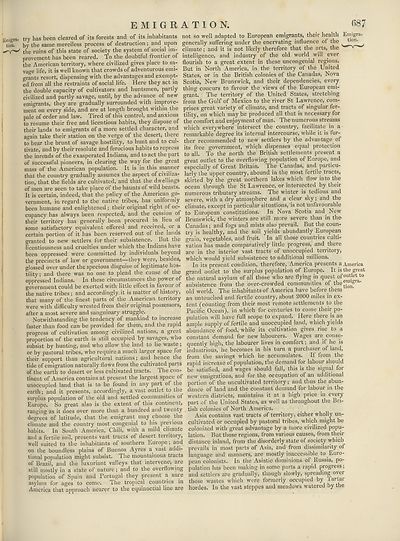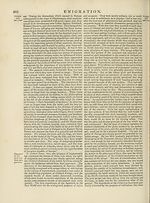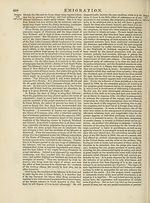Encyclopaedia Britannica > Volume 8, DIA-England
(697) Page 687
Download files
Complete book:
Individual page:
Thumbnail gallery: Grid view | List view

E M I G R
Kmiara- try has been cleared of its forests and of its inhabitants
tion. by the same merciless process of destruction; and upon
the ruins of this state of society the system of social im¬
provement has been reared. To the doubtful frontier of
the American territory, where civilized gives place to sa¬
vage life, it is well known that crowds of adventurous emi¬
grants resort, dispensing with the advantages and exempt¬
ed from all the restraints of social life. Here they act in
the double capacity of cultivators and huntsmen, partly
civilized and partly savage, until, by the advance of new
emigrants, they are gradually surrounded with improve¬
ment on every side, and are at length brought within the
pale of order and law. Tired of this control, and anxious
to resume their free and licentious habits, they dispose of
their lands to emigrants of a more settled character, and
again take their station on the verge of the desert, there
to bear the brunt of savage hostility, to hunt and to cul¬
tivate, and by their resolute and ferocious habits to repress
the inroads of the exasperated Indians, and to act the part
of successful pioneers, in clearing the way for the great
mass of the American population. It is in this manner
that the country gradually assumes the aspect of civiliza¬
tion, that the fields are cultivated, and that the dwellings
of men are seen to take place of the haunts of wild beasts.
It is certain, indeed, that the policy of the American go¬
vernment, in regard to the native tribes, has uniformly
been humane and enlightened; their original right of oc¬
cupancy has always been respected, and the cession of.
their territory has generally been procured in lieu of
some satisfactory equivalent offered and received, 01 a
certain portion of it has been reserved out of the lands
granted to new settlers for their subsistence. But the
licentiousness and cruelties under which the Indians have
been oppressed were committed by individuals beyond
the precincts of law or government—they were, besides,
glossed over under the specious disguise of legitimate hos¬
tility; and there was no one to plead the cause of the
oppressed Indians. In these circumstances the power of
government could be exerted with little effect in fayoui of
the native tribes; and accordingly it is matter of history,
that many of the finest parts of the American territory
were with difficulty wrested from their original possessors,
after a most severe and sanguinary struggle.
Notwithstanding the tendency of mankind to increase
faster than food can be provided for them, and the rapid
progress of cultivation among civilized nations, a great
proportion of the earth is still occupied by savages, who
subsist by hunting, and who allow the land to lie waste ;
or by pastoral tribes, who require a much larger space for
their support than agricultural nations; and hence the
tide of emigration naturally flows from the cultivated parts
of the earth to desert or less cultivated tracts. The con¬
tinent of America contains at present the largest space of
unoccupied land that is to be found in any part of the
earth; and it presents, accordingly, a vast outlet to tne
surplus population of the old and settled communities of
Europe. So great also is the extent of this continent,
ranging as it does over more than a hundred and twenty
degrees of latitude, that the emigrant may choose the
climate and the country most congenial to his previous
habits. In South America, Chili, with a mild climate
and a fertile soil, presents vast tracts of desert territory^,
well suited to the inhabitants of southern Europe; and
on the boundless plains of Buenos Ayres a vast addi¬
tional population might subsist. Ihe mountainous tracts
of Brazil, and the luxuriant valleys that intervene; are
still mostly in a state of nature; and to the overflowing
population of Spain and Portugal they present a sure
asylum for ages to come. The tropical countries in
America that approach nearer to the equinoctial line are
A T I O N. G87
not so well adapted to European emigrants, their health Emigra-
generally suffering under the enervating influence of the , tyon-
climate; and it is not likely therefore that the arts, the
intelligence, and industry of the old world will ever
flourish to a great extent in these uncongenial regions.
But in North America, in the territory of the United
States, or in the British colonies of the Canadas, Nova
Scotia, New Brunswick, and their dependencies, every
thing concurs to favour the views of the European emi¬
grant. The territory of the United States, stretching
from the Gulf of Mexico to the river St Lawrence, com¬
prises great variety of climate, and tracts of singular fer¬
tility, on which may be produced all that is necessary for
the comfort and enjoyment of man. The numerous streams
which everywhere intersect the country, facilitate in a
remarkable degree its internal intercourse, while it is fur¬
ther recommended to new settlers by the advantage of
its free government, which dispenses equal protection
to all. To the north the British settlements present a
great outlet to the overflowing population of Europe, and
especially of Great Britain. I he Canadas, and particu¬
larly the upper country, abound in the most fertile tracts,
skirted by the great northern lakes which flow into the
ocean through the St Lawrence, or intersected by their
numerous tributary streams. The winter is tedious and
severe, with a dry "atmosphere and a clear sky; and the
climate, except in particular situations, is not unfavourable
to European constitutions. In Nova Scotia and New
Brunswick, the winters are still more severe than in the
Canadas; and fogs and mists also prevail. But the coun¬
try is healthy, and the soil yields abundantly European
grain, vegetables, and fruit. In all those countries culti¬
vation has made comparatively little progress, and there
are in the interior vast tracts of unoccupied territory,
which would yield subsistence to additional millions.
In its present condition, therefore, America presents a America
grand outlet to the surplus population of Europe. It is the great
the natural asylum of all those who are flying in quest ofout.let t0
subsistence from the over-crowded communities of the®™^ra'
old world. The inhabitants of America have before them
an untouched and fertile country, about 2000 miles in ex¬
tent (counting from their most remote settlements to the
Pacific Ocean), in which for centuries to come their po¬
pulation will have full scope to expand. Here there is an
ample supply of fertile and unoccupied land, which yields
abundance of food, while its cultivation gives rise to a
constant demand for new labourers. Wages are conse¬
quently high, the labourer lives in comfort; and if he is
industrious, he becomes in his turn a purchaser of land,
from the savings which he accumulates. If from the
rapid increase of population, the demand for labour should
be satisfied, and wages should fall, this is the signal for
new emigrations, and tor the occupation ot an additional
portion of the uncultivated territory; and thus the abun¬
dance of land and the constant demand for labour in the
western districts, maintains it at a high price in every
part of the United States, as well as throughout the Bri¬
tish colonies of North America.
Asia contains vast tracts of territory, either wholly un¬
cultivated or occupied by pastoral tribes, which might be
colonized with great advantage by a more civilized popu¬
lation. But those regions, from various causes, from their
distance inland, from the disorderly state of society which
prevails in most parts of Asia, and from dissimilarity ot
language and manners, are mostly inaccessible to Euro¬
pean colonists. In the Asiatic dominions of Russia, po¬
pulation has been making in some parts a rapid progress;
and settlers are gradually, though slowly, spreading over
those wastes which were formerly occupied by Tartar
hordes. In the vast steppes and meadows watered by the
Kmiara- try has been cleared of its forests and of its inhabitants
tion. by the same merciless process of destruction; and upon
the ruins of this state of society the system of social im¬
provement has been reared. To the doubtful frontier of
the American territory, where civilized gives place to sa¬
vage life, it is well known that crowds of adventurous emi¬
grants resort, dispensing with the advantages and exempt¬
ed from all the restraints of social life. Here they act in
the double capacity of cultivators and huntsmen, partly
civilized and partly savage, until, by the advance of new
emigrants, they are gradually surrounded with improve¬
ment on every side, and are at length brought within the
pale of order and law. Tired of this control, and anxious
to resume their free and licentious habits, they dispose of
their lands to emigrants of a more settled character, and
again take their station on the verge of the desert, there
to bear the brunt of savage hostility, to hunt and to cul¬
tivate, and by their resolute and ferocious habits to repress
the inroads of the exasperated Indians, and to act the part
of successful pioneers, in clearing the way for the great
mass of the American population. It is in this manner
that the country gradually assumes the aspect of civiliza¬
tion, that the fields are cultivated, and that the dwellings
of men are seen to take place of the haunts of wild beasts.
It is certain, indeed, that the policy of the American go¬
vernment, in regard to the native tribes, has uniformly
been humane and enlightened; their original right of oc¬
cupancy has always been respected, and the cession of.
their territory has generally been procured in lieu of
some satisfactory equivalent offered and received, 01 a
certain portion of it has been reserved out of the lands
granted to new settlers for their subsistence. But the
licentiousness and cruelties under which the Indians have
been oppressed were committed by individuals beyond
the precincts of law or government—they were, besides,
glossed over under the specious disguise of legitimate hos¬
tility; and there was no one to plead the cause of the
oppressed Indians. In these circumstances the power of
government could be exerted with little effect in fayoui of
the native tribes; and accordingly it is matter of history,
that many of the finest parts of the American territory
were with difficulty wrested from their original possessors,
after a most severe and sanguinary struggle.
Notwithstanding the tendency of mankind to increase
faster than food can be provided for them, and the rapid
progress of cultivation among civilized nations, a great
proportion of the earth is still occupied by savages, who
subsist by hunting, and who allow the land to lie waste ;
or by pastoral tribes, who require a much larger space for
their support than agricultural nations; and hence the
tide of emigration naturally flows from the cultivated parts
of the earth to desert or less cultivated tracts. The con¬
tinent of America contains at present the largest space of
unoccupied land that is to be found in any part of the
earth; and it presents, accordingly, a vast outlet to tne
surplus population of the old and settled communities of
Europe. So great also is the extent of this continent,
ranging as it does over more than a hundred and twenty
degrees of latitude, that the emigrant may choose the
climate and the country most congenial to his previous
habits. In South America, Chili, with a mild climate
and a fertile soil, presents vast tracts of desert territory^,
well suited to the inhabitants of southern Europe; and
on the boundless plains of Buenos Ayres a vast addi¬
tional population might subsist. Ihe mountainous tracts
of Brazil, and the luxuriant valleys that intervene; are
still mostly in a state of nature; and to the overflowing
population of Spain and Portugal they present a sure
asylum for ages to come. The tropical countries in
America that approach nearer to the equinoctial line are
A T I O N. G87
not so well adapted to European emigrants, their health Emigra-
generally suffering under the enervating influence of the , tyon-
climate; and it is not likely therefore that the arts, the
intelligence, and industry of the old world will ever
flourish to a great extent in these uncongenial regions.
But in North America, in the territory of the United
States, or in the British colonies of the Canadas, Nova
Scotia, New Brunswick, and their dependencies, every
thing concurs to favour the views of the European emi¬
grant. The territory of the United States, stretching
from the Gulf of Mexico to the river St Lawrence, com¬
prises great variety of climate, and tracts of singular fer¬
tility, on which may be produced all that is necessary for
the comfort and enjoyment of man. The numerous streams
which everywhere intersect the country, facilitate in a
remarkable degree its internal intercourse, while it is fur¬
ther recommended to new settlers by the advantage of
its free government, which dispenses equal protection
to all. To the north the British settlements present a
great outlet to the overflowing population of Europe, and
especially of Great Britain. I he Canadas, and particu¬
larly the upper country, abound in the most fertile tracts,
skirted by the great northern lakes which flow into the
ocean through the St Lawrence, or intersected by their
numerous tributary streams. The winter is tedious and
severe, with a dry "atmosphere and a clear sky; and the
climate, except in particular situations, is not unfavourable
to European constitutions. In Nova Scotia and New
Brunswick, the winters are still more severe than in the
Canadas; and fogs and mists also prevail. But the coun¬
try is healthy, and the soil yields abundantly European
grain, vegetables, and fruit. In all those countries culti¬
vation has made comparatively little progress, and there
are in the interior vast tracts of unoccupied territory,
which would yield subsistence to additional millions.
In its present condition, therefore, America presents a America
grand outlet to the surplus population of Europe. It is the great
the natural asylum of all those who are flying in quest ofout.let t0
subsistence from the over-crowded communities of the®™^ra'
old world. The inhabitants of America have before them
an untouched and fertile country, about 2000 miles in ex¬
tent (counting from their most remote settlements to the
Pacific Ocean), in which for centuries to come their po¬
pulation will have full scope to expand. Here there is an
ample supply of fertile and unoccupied land, which yields
abundance of food, while its cultivation gives rise to a
constant demand for new labourers. Wages are conse¬
quently high, the labourer lives in comfort; and if he is
industrious, he becomes in his turn a purchaser of land,
from the savings which he accumulates. If from the
rapid increase of population, the demand for labour should
be satisfied, and wages should fall, this is the signal for
new emigrations, and tor the occupation ot an additional
portion of the uncultivated territory; and thus the abun¬
dance of land and the constant demand for labour in the
western districts, maintains it at a high price in every
part of the United States, as well as throughout the Bri¬
tish colonies of North America.
Asia contains vast tracts of territory, either wholly un¬
cultivated or occupied by pastoral tribes, which might be
colonized with great advantage by a more civilized popu¬
lation. But those regions, from various causes, from their
distance inland, from the disorderly state of society which
prevails in most parts of Asia, and from dissimilarity ot
language and manners, are mostly inaccessible to Euro¬
pean colonists. In the Asiatic dominions of Russia, po¬
pulation has been making in some parts a rapid progress;
and settlers are gradually, though slowly, spreading over
those wastes which were formerly occupied by Tartar
hordes. In the vast steppes and meadows watered by the
Set display mode to:
![]() Universal Viewer |
Universal Viewer | ![]() Mirador |
Large image | Transcription
Mirador |
Large image | Transcription
Images and transcriptions on this page, including medium image downloads, may be used under the Creative Commons Attribution 4.0 International Licence unless otherwise stated. ![]()
| Encyclopaedia Britannica > Encyclopaedia Britannica > Volume 8, DIA-England > (697) Page 687 |
|---|
| Permanent URL | https://digital.nls.uk/193332066 |
|---|
| Attribution and copyright: |
|
|---|
| Description | Ten editions of 'Encyclopaedia Britannica', issued from 1768-1903, in 231 volumes. Originally issued in 100 weekly parts (3 volumes) between 1768 and 1771 by publishers: Colin Macfarquhar and Andrew Bell (Edinburgh); editor: William Smellie: engraver: Andrew Bell. Expanded editions in the 19th century featured more volumes and contributions from leading experts in their fields. Managed and published in Edinburgh up to the 9th edition (25 volumes, from 1875-1889); the 10th edition (1902-1903) re-issued the 9th edition, with 11 supplementary volumes. |
|---|---|
| Additional NLS resources: |
|

